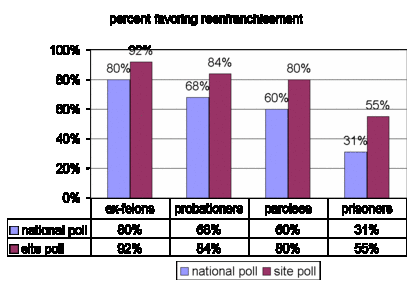 Visitors to the site were decidedly more favorable toward voting rights for all groups, but both polls revealed the same gradient of support -- strongest for ex-felons who have done their time, weakest for current prisoners, with those supervised in their communities on probation and parole falling somewhere between the two extremes. So, the public represented in the Harris poll would favor a system such as Ohio or Illinois, where only prisoners are disenfranchised. Many of the site visitors would go farther and enfranchise prisoners as well, as is currently the practice in Maine and Vermont. Neither group of respondents would prefer a stricter system such as Minnesota's or Wisconsin's, in which probationers and parolees are disenfranchised. Most conspicuously, perhaps, only 20% nationally and 8% of site visitors favored indefinite disenfranchisement of former felons as well as current felons, as is currently the case in Florida, Mississippi, Alabama, Arizona, Virginia and other states (note: the map hasn't been updated to include 2005 changes in Iowa and Nebraska).
Visitors to the site were decidedly more favorable toward voting rights for all groups, but both polls revealed the same gradient of support -- strongest for ex-felons who have done their time, weakest for current prisoners, with those supervised in their communities on probation and parole falling somewhere between the two extremes. So, the public represented in the Harris poll would favor a system such as Ohio or Illinois, where only prisoners are disenfranchised. Many of the site visitors would go farther and enfranchise prisoners as well, as is currently the practice in Maine and Vermont. Neither group of respondents would prefer a stricter system such as Minnesota's or Wisconsin's, in which probationers and parolees are disenfranchised. Most conspicuously, perhaps, only 20% nationally and 8% of site visitors favored indefinite disenfranchisement of former felons as well as current felons, as is currently the case in Florida, Mississippi, Alabama, Arizona, Virginia and other states (note: the map hasn't been updated to include 2005 changes in Iowa and Nebraska).I'm of course very skeptical of such online poll results (and confess that some of those 1,000 votes came from my computer and many more came from the computers of my students). Nevertheless, I was happy to discover some degree of diversity among site visitors and the same gradient of support for the voting rights of non-incarcerated felons. I'm also grateful that about 1,000 people took the time to read the survey and vote. Thanks!

No comments:
Post a Comment